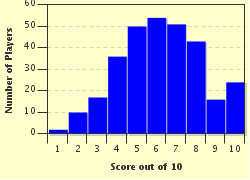Quiz Answer Key and Fun Facts
1. The use of bottled water grew exponentially during the early 21st century, but how long has bottled water been around?
2. Which type of water, commonly used in industrial applications, has been lauded for drinking purposes as being "pure water" and been criticized as being "dead water"?
3. Both mineral and spring water come from water that has risen from aquifers beneath the surface. In what way do they differ?
4. After entering the bottled water market in 1994, PepsiCo product, Aquafina, soon became one of the best-selling bottled waters in the world. What did PepsiCo reveal about their product several years later?
5. The popularity of the office water cooler has led to a market for home water coolers. What process is usually used to purify the water for these coolers?
6. How long can bottled water safely be stored?
7. Bottled water has been touted as being healthier than tap water. What evidence has been presented to dispute this claim?
8. Which compound, once commonly found in plastic water bottles, started being phased out during the early 2000s as concerns arose regarding its safety?
9. What claim regarding plastic water bottles has been debunked as an internet hoax?
10. One of the main complaints against plastic water bottles is that not everyone recycles the bottles. But even if everyone did, what is another recycling-related complaint against the bottles?
Source: Author
PDAZ
This quiz was reviewed by FunTrivia editor
WesleyCrusher before going online.
Any errors found in FunTrivia content are routinely corrected through our feedback system.

